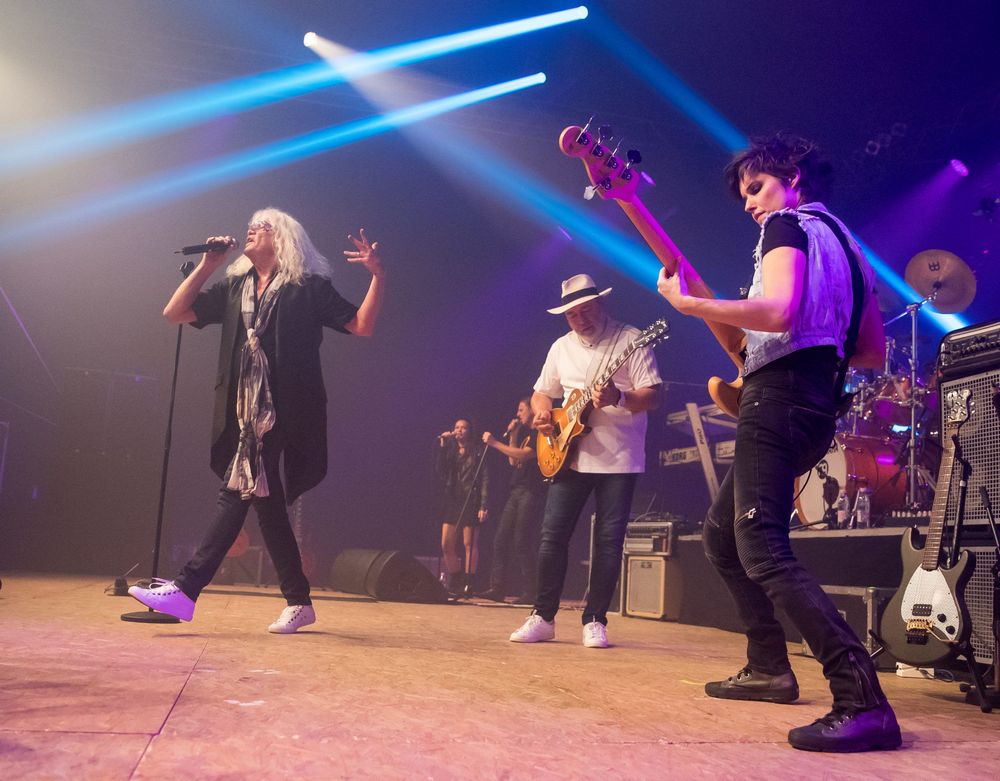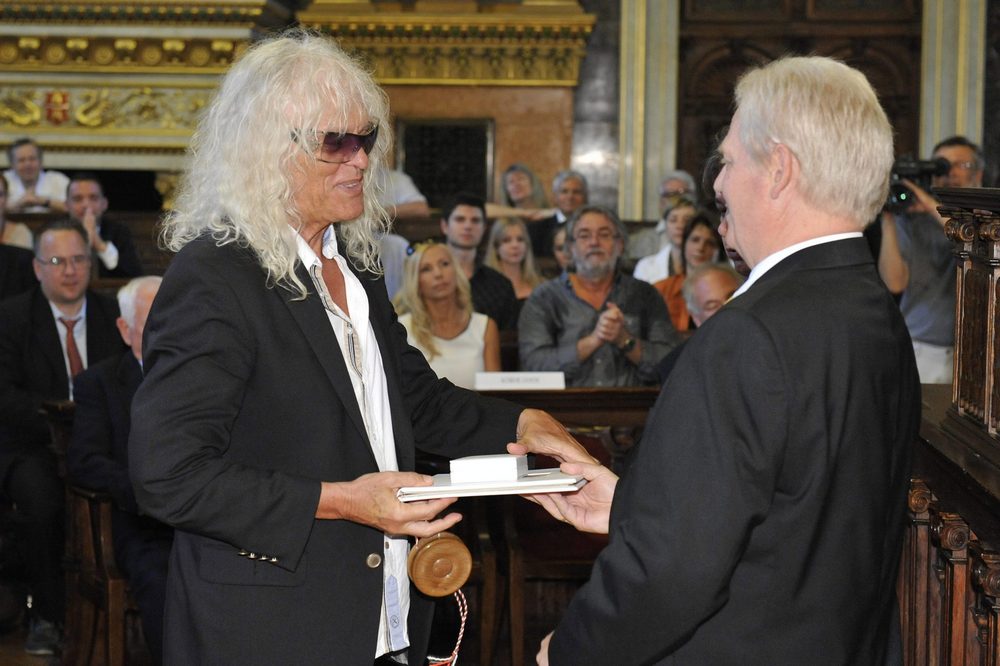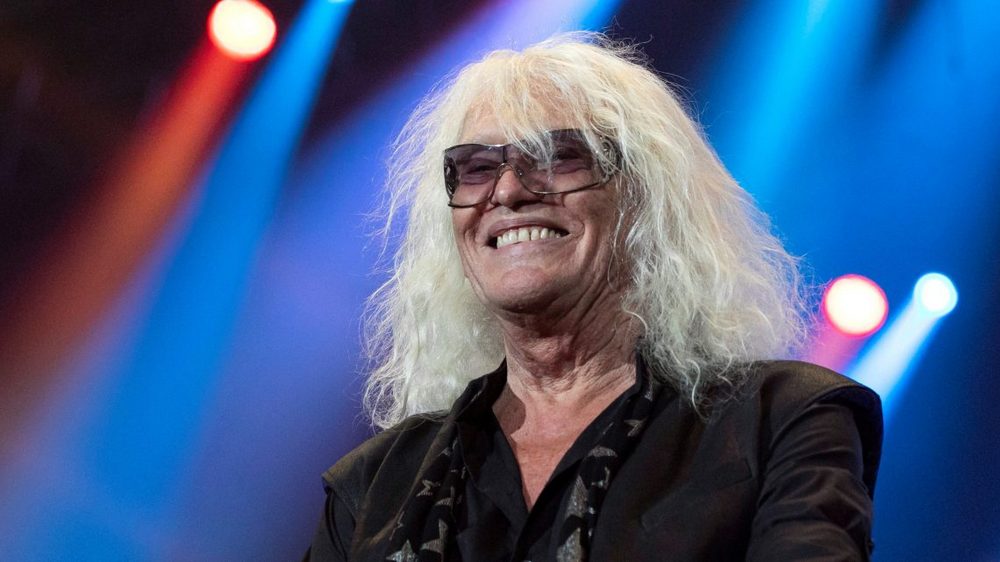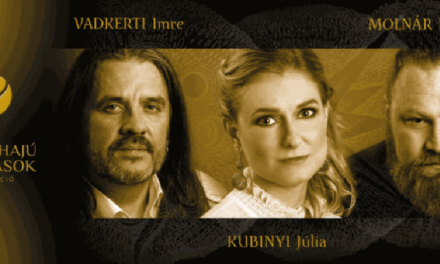His father was a recognized financial specialist, and his mother also worked in finance. He himself was prepared to be an athlete, but due to an injury, his plans went up in smoke. That's when he started playing music more seriously.
In the band he founded with his peers at József Attila High School, the line-up was decided by drawing lots, so Kóbor became the guitarist, and József Laux sat behind the drums. The instrument hung around his neck for only five years, after which he finally ended up singing as a member of the band Ciklon and then Proféta.
János Kóbor - or, as his friends and fellow musicians called him, Mecky - never trained his hoarse, hard-toned voice with a teacher.
He earned an architectural engineering degree at the Budapest University of Technology, while becoming more and more immersed in music. On September 23, 1962, the orchestra of the University of Applied Sciences performed under the name Omega for the first time in the castle dormitory of the BME. Omega's first era up to 1967 was not a triumphal procession, it belonged to the second line of mushrooming beat bands, and its program consisted of performances of Anglo-Saxon numbers. In the beginning, the band leader and keyboard player László Benkő also sang , but then Mecky stepped forward as the frontman.

The Omega ensemble in 1970: Tamás Mihály, László Benkő, György Molnár, Ferenc Debreczeni (back row, bj) and János Kóbor (front) (Source: National Photo Gallery)
The arrival of Adamis and Presser was the recipe for Omega's success
Omega's second era began in 1967 with the entry of keyboardist Gábor Presser, at which time Tamás Mihály was the bass guitarist, and György Molnár played the guitar. Presser proved to be an inventive composer, the lyrics of their songs were written by Anna Adamis.
Their first radio recordings and their first single were made in 1967, and they accompanied Zalatnay Sarolta's first award-winning song (I Can't Wait for Tomorrow) at the Dance Song Festival. In 1968, they were the first Hungarian band to release their LP, Trombitás Frédi and Rettenetes emberek. The record company allowed the disc to be released because Omega had already recorded an English-language record during their English tour in the summer of that year - although the others sang instead of Kóbor, who stayed at home.
At the end of 1968, Omega was indisputably the number two band behind Illés, and after the record in England, they began to believe that a Hungarian band could also reach the top of the world.
They didn't leave the management of the band to chance, they got a gig in Tokyo and a German record contract
Omega's second album, Ten Thousand Steps, was released in 1970, The Pearl-Haired Girl received a special prize at the Yamaha festival in Tokyo, and since then many foreign covers have been made. However, the band's steep upward trajectory was derailed in the spring of 1971, when Presser and Laux unexpectedly left to form LGT.
Omega managed to renew itself with hard work, Ferenc Debreczeni sat behind the drums, they sang about the loss in their song "Unfaithful Friends". Each member became more serene in terms of songwriting, Kóbor wrote lyrics (sometimes music as well), and they all put more weight on the visuals and sound on stage.

Photo: Balázs Mohai / MTI
In 1973, they signed a recording contract with the West German company Bellaphon, and thanks to their albums and concerts, they became popular all over Europe, especially in the German-speaking area.
The members "recycled" most of the money earned from the German record contract: they bought world-class equipment and rented a laser light show. They gave 150-200 concerts a year, their records (Időrabló, Csillagok være) were distributed in almost sixty countries, and they came close to world fame.
However, their hopeless struggle with the rigid domestic authorities made it impossible to move forward, they did not want to defect.
Omega reached its creative peak at the end of the seventies, but the specific "space rock" that they (also) represented, following the direction set by David Bowie, creating a floating feeling (space rock) no longer prevailed in the new wave environment of the eighties as it had before .
They started economic enterprises: they set up a studio in the basement of Kóbor's house, contributed as music directors to other people's recordings, and after the regime change, they participated in the consortium that bought the successor to Hungaroton.
With minor breaks, they worked non-stop, gave concerts, and even created new songs. In the first half of the decade, they released their hits on CD with symphonic arrangements, and performed their songs with religious themes at church concerts.
In 2010, János Kóbor released a solo album, a 17-movement rhapsody.
His long-time wish came true in 2014, when Omega was able to give a free concert in Hősök square in the company of the German Scorpions in honor of the 25th anniversary of the regime change, and sang the song Wind of Change with Klaus Meine in front of a crowd of hundreds of thousands.
In 2017, fans were able to see the 55-year-old Omega and the long-haired Stray roaming the stage with his characteristically relaxed movements at several domestic and foreign concerts. The European tour "Once Upon a Time in the Wild East" continued in 2018, and the band, supplemented by younger musicians and vocalists, pampered its fans with world-class sound and sight.
He received all the major awards, but the love of the audience meant the most to him

Kossuth Award-winning performer János Kóbor, the singer of Omega, receives the title of honorary citizen from Mayor István Tarlós at the Independence Day ceremony in Budapest, at the Új Városháza Díszterme, on June 19, 2013 (Photo: MTI/Lajos Soós)
Omega received the Ferenc Liszt Prize in 1987 and the Kossuth Prize in 2013 for their pioneering role in Hungarian popular music, in recognition of their half-century long artistic career, surrounded by the love of the public, constantly renewing, achieving unique international successes in Hungarian rock history, and becoming legendary. In 2018, they received the Fonogram Lifetime Achievement Award.
János Kóbor was awarded the Officer's Cross of the Hungarian Republic in 1998, in 2013 he became an honorary citizen of Budapest and received the Grand Cross of the Russian Orthodox Order of Merit.
has sold 50 million albums worldwide during its impressive career and in Hungary, after five million albums sold, Omega received a diamond disc for the first time. Their seventeenth and final album, Testamentum, was released in November 2020, one week after the death of László Benkő and Tamás Mihály, and became a quadruple platinum record by the summer of 2021. In 2022 – on their 60th anniversary – GrundRecords launched the Omega Lifetime Series.
János Kóbor could no longer afford this; He died on December 6, 2021, at the age of 79, after a short illness.
Source: hirado.hu
Featured image: János Kóbor, singer of the band Omega (Photo: MTI/ István iró)












